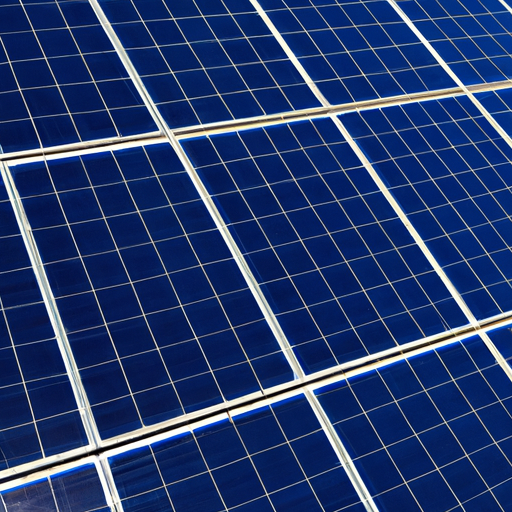So you’re considering switching to solar energy and wondering if financing options are available for solar panel installation. Well, the good news is that there are indeed various financing options to help you make the switch to clean and sustainable energy. From government incentives to loans and leasing programs, there are solutions that can fit your budget and make solar panel installation a viable and affordable option for you. In this article, we’ll explore the different financing options available to help you make an informed decision and take a step towards a greener future. Yes, there are several financing options available for solar panel installation. Whether you’re looking for a loan, lease, grant, or rebate, there are programs and incentives designed to make solar energy more affordable and accessible. In this article, we will explore a variety of financing options that can help you go solar and reap the benefits of renewable energy.
Loans for Solar Panel Installation
Solar Loans from Banks
One option for financing your solar panel installation is to take out a loan from a bank. Many banks offer specialized loans for solar projects, with interest rates that are often lower than other types of loans. These loans can be used to cover the cost of purchasing and installing solar panels, and they typically have flexible repayment terms that fit your budget.
Home Equity Loans
If you have built up equity in your home, you may qualify for a home equity loan to finance your solar panel installation. With a home equity loan, you borrow against the value of your home, using it as collateral for the loan. This can be a great option if you have good credit and want to take advantage of the low interest rates typically associated with home equity loans.
Solar Lease Transfer Loans
If you’re currently leasing your solar panels and want to take ownership of them, you may be able to obtain a lease transfer loan. This type of loan allows you to transfer the lease agreement to your name and make monthly loan payments instead of lease payments. It’s a great way to take advantage of the benefits of solar ownership without the upfront costs.
Federal Loans
The federal government offers several loan programs that can help finance your solar panel installation. One example is the FHA Title 1 loan program, which provides homeowners with funds to make energy-efficient improvements, including solar panel installations. These loans are backed by the government, which means they often have lower interest rates and more flexible qualification requirements.
State and Local Loans
In addition to federal loans, many state and local governments offer their own loan programs to encourage the adoption of solar energy. These loans may have specific eligibility requirements and interest rates that vary by location. Some states even offer low-interest or zero-interest loans for solar installations, making it even more affordable for homeowners to go solar.
Solar Panel Lease Options
Power Purchase Agreements (PPAs)
Power purchase agreements, or PPAs, are a type of solar lease option where you pay for the electricity generated by the solar panels instead of purchasing the panels themselves. With a PPA, a solar company installs and maintains the panels on your property, and you purchase the electricity they produce at a predetermined rate. This can be a convenient and cost-effective way to go solar without the upfront expenses.
Solar Leasing Companies
There are numerous solar leasing companies that offer lease options for homeowners who want to go solar. These companies handle the installation, maintenance, and ownership of the solar panels, while you make monthly lease payments. Solar leasing can be a good option if you don’t want to deal with the upfront costs or maintenance of owning your solar panels.
Leasing vs. Buying
When considering solar panel installation, it’s important to weigh the pros and cons of leasing versus buying. Leasing allows you to go solar with little or no upfront costs and typically includes maintenance and monitoring services. On the other hand, purchasing solar panels gives you ownership and allows you to benefit from the financial incentives and long-term savings that come with solar ownership. It’s important to carefully evaluate your financial situation and future goals before deciding on the best option for you.
Government Incentives and Programs
Federal Investment Tax Credit (ITC)
The Federal Investment Tax Credit, or ITC, is one of the most significant solar incentives available. It allows homeowners to deduct a percentage of the cost of their solar panel installation from their federal taxes. The ITC is currently set at 26% for residential solar projects but is scheduled to step down to 22% in 2023. Taking advantage of the federal ITC can significantly reduce your overall solar installation costs.
State and Local Rebates and Incentives
In addition to the federal ITC, many state and local governments offer their own rebates and incentives for solar panel installation. These can include cash rebates, grants, property tax exemptions, sales tax exemptions, and other financial incentives. The availability and amount of these incentives vary by location, so it’s important to research what your state and local government offer.
Property Tax Exemptions
Some states provide property tax exemptions for homeowners who install solar panels. These exemptions can help reduce the overall cost of your solar installation by lowering your property tax bill. This is an additional financial incentive that can make going solar even more affordable.
Renewable Energy Grants
There are also nonprofit organizations, foundations, and government programs that offer grants for renewable energy projects, including solar panel installations. These grants can provide additional funding to help offset the upfront costs of going solar. Researching and applying for these grants can potentially provide a significant financial boost to your solar project.
Solar Power Purchase Agreements (PPAs)
Understanding PPAs
A Power Purchase Agreement, or PPA, is a financing arrangement where a solar company installs and maintains the solar panels on your property, and you agree to purchase the electricity they produce at a predetermined rate. It is a long-term contract typically spanning 10 to 25 years. PPAs are commonly used for commercial solar installations but are also available for residential properties.
How PPAs Work
Under a PPA, the solar company retains ownership of the panels, and you benefit from the electricity they generate. You pay for the electricity produced by the panels at a fixed rate, typically lower than utility rates. The solar company is responsible for system maintenance, repairs, and any necessary upgrades. PPAs often include performance guarantees, ensuring that the panels will generate a certain amount of electricity over the contract period.
Benefits and Drawbacks
One of the main benefits of PPAs is that they require little to no upfront investment. This makes solar energy accessible for homeowners who may not have the funds to purchase their panels outright. Additionally, the fixed electricity rate under a PPA can protect you from future utility rate increases, potentially resulting in long-term savings. However, it’s important to consider that you won’t own the panels, and the length of the contract could limit your flexibility to make changes to your energy setup.
Crowdfunding and Community Solar
Solar Crowdfunding Platforms
Crowdfunding platforms have emerged as a unique way to finance solar projects. These platforms allow individuals to contribute funds to support the development of solar installations. By pooling resources from multiple investors, crowdfunding can help finance larger-scale projects that might otherwise be out of reach for individual homeowners. Some popular solar crowdfunding platforms include Mosaic and Solar Mosaic.
Community Solar Projects
Community solar projects are initiatives where a group of individuals or businesses collectively invests in a solar installation that benefits the entire community. These projects enable participants who may not have suitable rooftops or financial resources to still benefit from solar energy. By sharing the costs and benefits, community solar allows more people to access the advantages of renewable energy.
Benefits of Crowdfunding and Community Solar
Participating in solar crowdfunding or community solar projects can provide several advantages. You can support the development of renewable energy in your community while potentially earning a return on your investment. Additionally, these initiatives promote collective action and foster a sense of community engagement in sustainability efforts. Crowdfunding and community solar are great options for individuals who want to get involved in solar energy but may not be able to install panels on their own property.
Vendor Financing
Manufacturer Financing
Some solar panel manufacturers offer financing options to help homeowners purchase their products. Manufacturer financing programs may provide low or zero-interest loans or installment plans that allow you to pay for the solar panels over time. This can be a convenient option if you have identified a specific solar panel brand or manufacturer that you prefer.
Solar Installer Financing
In addition to manufacturer financing, many solar installers offer their own financing programs. These programs may have partnerships with financial institutions to provide loans or other financing options for solar installations. Working with a solar installer that offers financing can simplify the process and potentially provide more flexible financing terms.
Third-Party Financing Programs
There are also third-party financing programs specifically designed for solar panel installations. These programs work with various lenders to offer loans and lease options for homeowners looking to go solar. Third-party financing programs provide an alternative to traditional loans and can be a more streamlined approach to finding the right financing solution for your specific needs.
Homeowners Associations and Solar Financing
HOA Restrictions and Approvals
If you live in a community governed by a homeowners association (HOA), it’s important to familiarize yourself with any restrictions or approval processes related to solar panel installation. Some HOAs have guidelines that regulate the type, size, placement, and appearance of solar panels. It’s crucial to consult your HOA’s rules and communicate with the board to understand any limitations or requirements before proceeding with your solar project.
Legal Battlegrounds
Solar installations and homeowner associations have occasionally found themselves in legal disputes regarding the use and installation of solar panels. These disputes can revolve around aesthetic concerns, violation of HOA guidelines, or efforts to restrict solar panel installations altogether. Staying informed about the legal landscape and knowing your rights as a homeowner can help navigate potential conflicts with your HOA.
Alternative Solutions
If your homeowners association poses challenges to solar panel installation, there are alternative solutions to consider. For example, you could explore community solar projects or negotiate with your HOA to find a compromise that benefits both parties. Additionally, state laws and regulations sometimes provide protections for homeowners’ right to install solar panels, allowing you to pursue installation even if your HOA has restrictions.
Financial Institutions and Green Energy Investments
Green Bonds and Investments
Financial institutions have started to embrace green energy investments, offering products such as green bonds. Green bonds are investment vehicles where the proceeds are specifically used for environmentally friendly projects, including solar installations. By investing in green bonds, you can support the expansion of renewable energy while potentially earning a return on your investment.
Bank Financing for Solar Projects
Banks play a significant role in financing solar projects, both for commercial and residential sectors. Many banks offer tailored loan programs and financing options for solar installations. They may collaborate with solar installers or government initiatives to provide affordable and accessible financial solutions for homeowners. If you have an existing relationship with a bank, it’s worth exploring their offerings for solar financing.
Venture Capital and Private Equity
In addition to traditional banking institutions, venture capital firms and private equity investors are increasingly interested in funding renewable energy projects. These investors can provide capital to solar companies, enabling them to develop and expand their operations. While this type of financing is not directly accessible to individual homeowners, it plays a crucial role in the overall availability and affordability of solar panel installations.
Solar Panel Grants and Rebates
Nonprofit Organizations and Foundations
Nonprofit organizations and foundations often offer grants and rebates to support the adoption of solar energy. These grants can help cover a portion of the installation costs or provide funding for community solar projects. Researching and applying for grants from reputable nonprofit organizations can be a great way to supplement your budget and make your solar panel installation more affordable.
Government Grant Programs
In addition to federal grants and incentives, many state and local governments have their own grant programs to encourage the installation of solar panels. These grants can vary in size and eligibility requirements, so it’s important to research what programs are available in your area. Government grants can significantly reduce the upfront costs of going solar and provide financial support to homeowners.
Solar Rebate Programs
Some utility companies offer rebate programs as a financial incentive for homeowners to install solar panels. These programs provide cash rebates based on the size of the solar installation or the amount of energy it is expected to generate. Rebate amounts and eligibility criteria vary by utility and location, so it’s important to check with your local utility company for details.
Online Resources for Financing Options
Solar Financing Comparison Tools
There are several online resources that can help you compare different solar financing options. These comparison tools allow you to input your specific financial information and preferences, and they provide personalized recommendations based on that data. Some popular solar financing comparison tools include EnergySage and Solar-Estimate.
Government and Nonprofit Databases
Government agencies and nonprofit organizations often maintain comprehensive databases of available financing options for solar panel installations. These databases provide information on loans, grants, rebates, and other incentives that can help homeowners finance their solar projects. Checking these databases can help ensure that you are aware of all the financial resources available to you.
Online Calculators
Online solar calculators can be a helpful tool in assessing the financial viability of your solar panel installation. These calculators take into account factors such as your location, system size, energy consumption, and financing options to provide estimates on savings, payback periods, and return on investment. Using an online calculator can give you a clearer picture of the financial benefits of going solar.
In conclusion, there is a wide range of financing options available for solar panel installation. Whether you choose to pursue a loan, lease, grant, rebate, or other financial incentive, the resources outlined in this article can help you navigate the world of solar financing. By exploring these options and understanding their benefits and drawbacks, you can make an informed decision that aligns with your budget, goals, and commitment to renewable energy.









